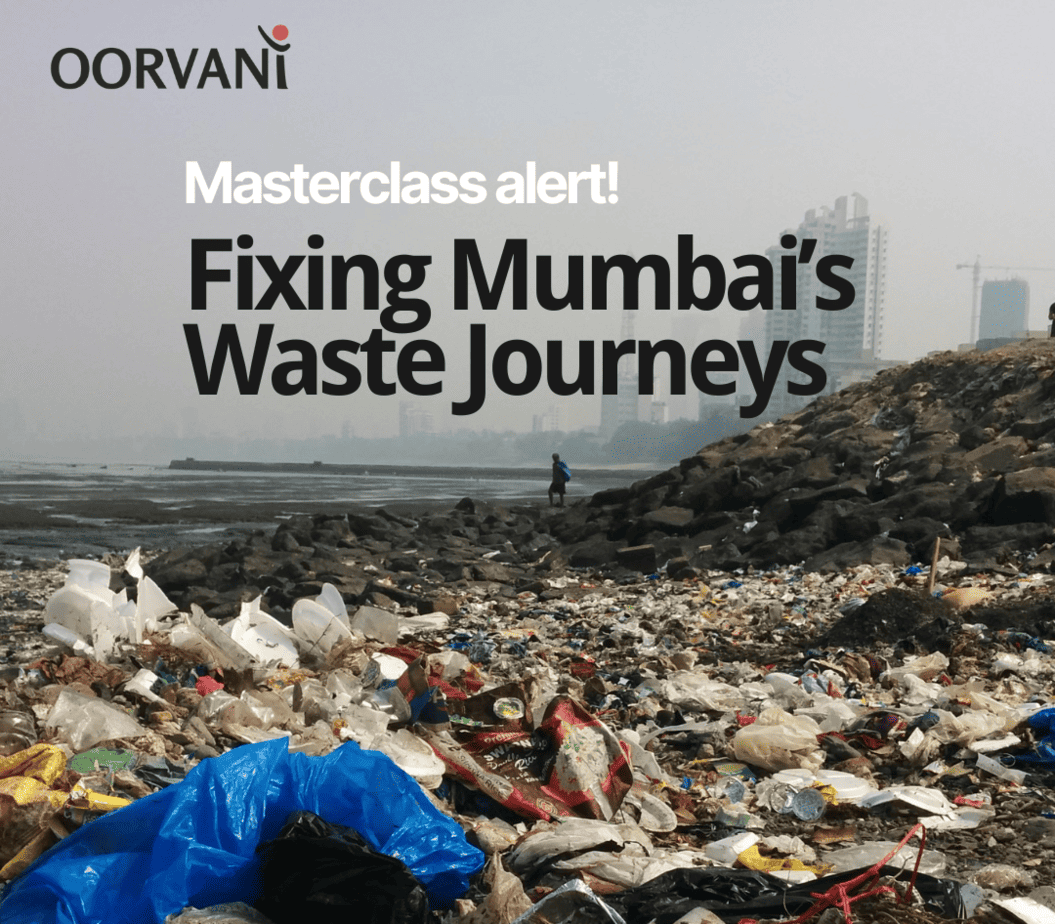On 12th September, Oorvani Foundation conducted a masterclass for Mumbaikars with an active interest in waste management, to learn about the waste lifecycle in the city and what they could do to prevent the bulk of their generated waste from reaching a landfill. This event was part of Climate Week India 2025.
The online masterclass started with attendees sharing their vision on the topic and what they would like to understand better.
The facilitators were Kedar Sohoni of Green Communities Foundation and Jyoti Mhapsekar from Stree Mukti Sanghatana (SMS).
Systemic issues and community-led solutions
Kedar began the learning session, delving into the problems caused by waste mismanagement and systemic issues in Mumbai.
Some highlights:
Mumbai sends 9800 tonnes of mixed waste to dumping grounds daily
Food waste (about 50% of total waste) releases methane, a gas 80 times more dangerous than CO2
India is the largest plastic polluter, burning or dumping 9.3 million tonnes every year, leading to microplastic contamination in air, food, water, breast milk, human placenta, and various organs, impacting nearly all bodily systems. Air, he noted, is the primary source of microplastics
Plastics contain over 16,000 chemicals, with more than 4,000 classified as hazardous, posing risks, especially when in contact with hot food or liquids.
He mentioned how the historical focus has been on clearing garbage from city streets, not on segregation at source. Waste collection contracts often pay based on the volume of waste transported, creating a disincentive for them to encourage or push for segregation or decentralised processing.
Efforts towards decentralised waste management are hampered by large contractors who benefit from centralised dumping, a “not in my backyard” (NIMBY) syndrome, the premium on space in Mumbai, and inadequate infrastructure.
Despite the BMC spending around ₹3000 crores on waste management, the city faces a “three-headed monster” of wasted resources, high costs and pollution.
Kedar also spoke of a notable project of Green Communities Foundation in a Ghatkopar slum, where they addressed the lack of door-to-door waste collection by building community trust and implementing an incentive system for dry waste segregation. This resulted in diverting 1.2 tonnes of waste from landfills in two months from 200 households.
He concluded by offering simple home composting methods (food waste + “browns” + accelerator) and urged individuals to influence their homes, communities, and local officials, advocating for coordinated citizen action.

Biogas plants as a solution
Jyoti Mhapsekar’s presentation highlighted the crucial, often invisible, role of waste pickers in keeping the city clean. She noted that Stree Mukti Sanghatana (SMS) has worked with these 20,000 predominantly female workers for 25 years. She reminded participants that citizens are equally responsible for their waste, with 2016 rules placing ownership on waste generators, not solely the municipality.
Jyoti also explained how advanced biogas plants convert mixed wet waste into gas for electricity, boilers and cooking, citing the example of their biogas plant in Worli that has a 5-tonne capacity. While acknowledging the space constraints in Mumbai, she criticised the centralised 1000-tonne biogas plant planned at Deonar, which still requires long-distance waste transport.

Practical scenarios
Following the presentations and Q&A, the participants were divided into breakout rooms where they discussed how the waste from five typical generation points could be better managed:
- A slum without municipal collection
- A small office and manufacturing unit
- Festival-based waste
- Cooperative housing societies
- Restaurants & Cafes
Each team presented their findings on the categories of waste from the respective source, the resources available to better manage them, and action items.
The session was an eye-opener for all participants on the urgency of the issue. It was heartening to note the interactions and the depth of questions from attendees, raising hope for potential community action and more responsible waste management.

